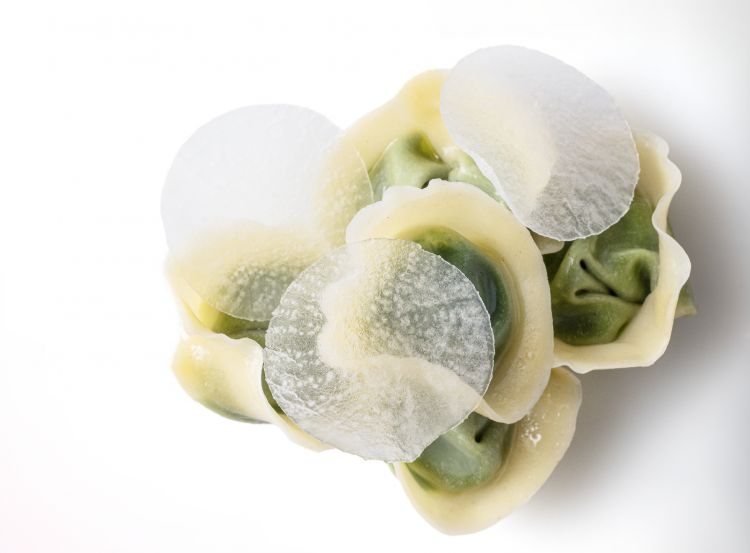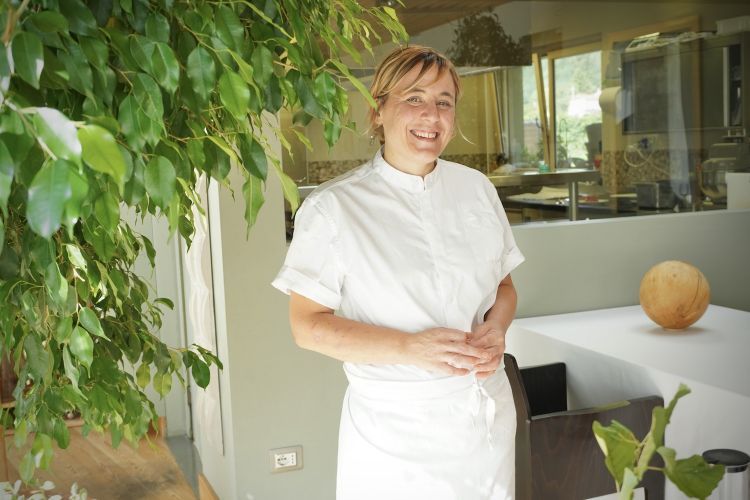"We are very happy that the signature dish of the 2024 Identità Milano congress is signed by Antonia Klugmann. While in the past we elected dishes mainly to pay homage to cooks and chefs we esteem and/or dishes that stand out for quality, aesthetics and innovation, from 2020 onwards we’ve chosen dishes that are also consistent with the current theme. The 2024 leitmotif is Disobedience: Klugmann has a vision of her profession and of the restaurant universe that is unlike any other. The dish she has worked on is truly disobedient because it breaks the mould. It expresses a thought that is hers and hers alone, one of the strongest identities to be found."
Paolo Marchi
Ravioli alle erbe e rapa bianca (Ravioli with herbs and white turnip) by Antonia Klugmann, chef and owner of the Argine a Vencò in Dolegna del Collio (Gorizia). This is the signature dish of the nineteenth edition of the Identità Golose congress (9/11 March 2024, Allianz MiCo, Milan), a device introduced in the third edition in 2007, when we elected Carlo Cracco's Dried Vegetables. It will be the fourth pasta dish in 16 editions, following Alfonso Caputo's Pasta ed elio (2008), Davide Scabin's Spaghetti pizza Margherita (2011) and Massimo Bottura's Immagine e somiglianza (2022). The first ever with fresh pasta.
"I wanted to work on a speciality that all Italians have in their DNA and on a dish that is representative of my ten-year journey," says Klugmann, "I wanted to express my love for herbs and the work we have done around the texture of fresh pasta. In the filling," she points out, "there is a puree of water and almonds - neutral, not bitter -, some very hard-to-find farmed rocket, parsley leaves from our vegetable garden, purple-collared turnip leaves - the turnip used to make brovada - and turnip top leaves. Very specific herbs, typical of the season."
Behind the dish there’s a very interesting historical background: "In Italian cookbooks, herbs are almost always very present but invisible. For me, they never have a decorative purpose but express a unique concept of concentration. Only we use marjoram, thyme, rosemary or bay leaves in such a rich yet invisible way. The challenge was to concentrate without spoiling the herbs."

The dish as portrayed by Brambilla/Serrani
The technique: "Like all the first courses I have on the menu, it is a very difficult dish: it has a very soft filling that forces me to break down the ravioli, and to be careful that they don't explode due to the swelling of the water in the freezer. Every time I try my hand at a first course, I expect from myself an analysis not only of the flavour but also of the technique, which is what makes a dish mine and mine alone. My wish is for people to be able to say: 'Only you could have made this kind of pasta'."
The prevailing flavour of the raviolo is bitter. "Historian Massimo Montanari has just written a book on how deeply rooted this flavour is in our cuisine. I believe it is the Italian taste par excellence, far more than sour or spicy. On the Argine's menu, it is in the place traditionally reserved for pre-desserts. The bitterness, like the sweetness of a sorbet, resets the palate experience and prepares for the next taste."
A disobedient starter, in line with the theme of the Identità 2024 congress: "For the very reason that it is bitter, it is anything but a round or indulging taste. In fact, it is the least favourite dish in the current tasting menu. But it expresses my disobedience, which for me is the difficulty I feel in following rules I disagree with. I have always tried to build my own ethics and my own sense of right and wrong. This isn’t a provocation; I’ve never been interested in provoking or surprising. I just wanted to reflect on a fresh pasta dish, such an Italian symbol. And so Friulian: here, ravioli have always been popular, from Carnia to Carso."

Antonia Klugmann, from Trieste, since 9 years ago at the helm of L'Argine a Vencò
Translated into English by Slawka G. Scarso